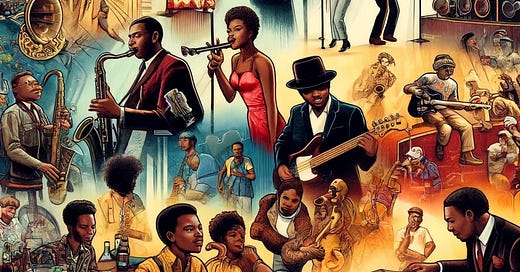In the heart of every chord and the soul of every lyric in Beyoncé's "Cowboy Carter," there lies a tapestry of stories waiting to be unraveled—a narrative deeply embedded in the essence of Black Americana. As we embark on this explorative journey through "Cowboy Carter," we are not merely dissecting an album; we are reclaiming narratives, celebrating resilience, and honoring the ancestral echoes that resonate within the music.
Beyoncé, through her artistry, serves as a conduit for cultural reclamation, intertwining the rich history of Black music with contemporary sounds, thereby crafting a mosaic of musical innovation that speaks volumes of the African Diaspora's journey, and specifically the Black United States American experience. This series, "Act III: A Reclamation of Black Americana," aims to peel away the layers of each song, exploring their decolonized roots, histories, and the origin of their sounds, thereby weaving a narrative that transcends time and space.
This blog series not only explores each song but also ties the entire album back to the overarching themes of Black Americana, resilience, and the decolonization of music genres traditionally seen through a non-Black lens. This series, titled "Act III: A Reclamation of Black Americana," will unfold in three parts, breaking down the album's songs through the eyes of myself, Desireé B. Stephens.
Part 1: The Roots of Reclamation
In the first installment of this series, we delve into the songs that lay the foundation of "Cowboy Carter," examining how each track serves as a narrative cornerstone in the reclamation of Black Americana.
Decolonizing the Sound: Here, we will explore the historical roots of the song's genre, tracing its origins back to African rhythms and melodies, and how it has been appropriated and evolved within American music. We discuss Beyoncé's role in reclaiming this sound within the context of modern Black music and how it reflects broader themes of resilience and resistance.
We will also discuss: “Reclaiming Identity Through Lyrics” This analysis focuses on the lyrical content of the song, breaking down how Beyoncé uses her platform to address themes of identity, freedom, and the Black United States American experience. Each song will be dissected to reveal its ties to historical Black narratives, movements, and history highlighting its importance in the decolonization process.
Part 2: The Spirit of Resistance
The second part of the series explores how "Cowboy Carter" serves as an anthem of resistance and empowerment, using music as a tool to challenge and deconstruct colonial narratives.
Echoes of Empowerment: An exploration of how the song embodies themes of empowerment and resilience, drawing parallels between the lyrics and historical acts of resistance within the Black community. The analysis delves into the song's instrumental arrangement, highlighting influences from genres that have historically been spaces of Black expression and resistance.
Melodies of Liberation: This section examines the liberatory potential of the song, both in terms of its sound and its message. The analysis focuses on how the track incorporates elements of traditional African music and narratives of liberation, crafting a sound that is both revolutionary and deeply rooted in Black cultural history.
Part 3: The Legacy of Liberation
In the final installment, we reflect on the cumulative impact of "Cowboy Carter," considering the album not just as a musical work, but as a cultural artifact that carries the legacy of Black Americana into the future.
The Future of Black Sound: An exploration of how the song points towards the future of Black music, encapsulating themes of hope, innovation, and the ongoing journey towards decolonization. This analysis discusses how Beyoncé uses her platform to envision a future where Black sound is liberated from colonial constraints, celebrating the endless possibilities of Black creativity.
Reclaiming Our Narratives: This final analysis focuses on the album's closing messages, exploring how the song encapsulates the themes of reclamation and decolonization that run throughout "Cowboy Carter." The discussion highlights how the album as a whole contributes to the ongoing project of reclaiming Black narratives, histories, and sounds, serving as a beacon of empowerment and resistance.
The Unending Journey of Reclamation
"Cowboy Carter" is more than just an album; it is a manifesto, a beacon in the ongoing journey of cultural reclamation and decolonization. Through her artistry, Beyoncé invites us to engage in a process of healing and liberation, offering a soundtrack for the reclamation of Black Americana. At the close of this series, is an invitation for us to carry forward the spirit of resistance and empowerment imbued in her music, continuing the unending journey of reclamation and decolonization.
This series will be for paying subscribers as a paid benefit for supporting the work that I do within the decolonization field.
As always,
With Love and Care,
Desireé B Stephens
Educator | Counselor | Community Builder





The ONLY THING that will liberate us is FBADOAS CASH REPARATIONS.